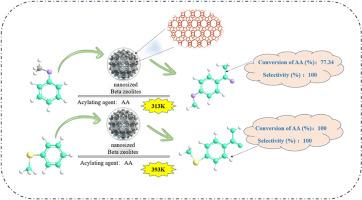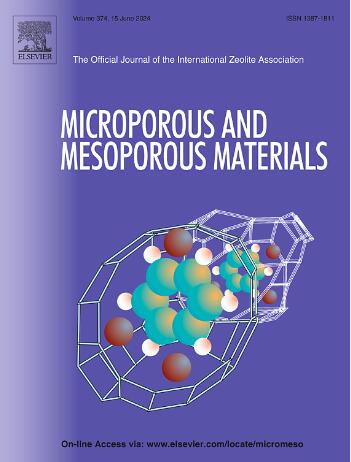低温下用于弗里德尔-卡夫斯酰化的纳米β沸石的制备和催化性能
IF 4.8
3区 材料科学
Q1 CHEMISTRY, APPLIED
引用次数: 0
摘要
通过二次水热合成法成功制备了纳米 Beta 沸石,该沸石在低温下对苯甲醚/硫代苯甲醚的 Friedel-Crafts 酯化反应中表现出优异而稳定的催化性能。本文系统研究了反应温度和反应物摩尔比对纳米 Beta 沸石催化性能的影响。在 313 K 时,醋酸酐转化率和 4-甲氧基苯丙酮选择性分别为 77.34 % 和 100 %;在 393 K 时,醋酸酐转化率和对甲硫基苯乙酮选择性均为 100 %。此外,动力学研究表明,催化反应遵循 Langmuir-Hinshelwood 机理,使用纳米 Beta 沸石进行苯甲醚和醋酐的 Friedel-Crafts 乙酰化反应的活化能仅为 41.52 kJ/mol。本文章由计算机程序翻译,如有差异,请以英文原文为准。

Preparation and catalytic performance of nano beta zeolites for Friedel–Crafts acylation at low temperature
The nano Beta zeolites were successfully prepared by secondary hydrothermal synthesis, which exhibited excellent and stable catalytic performance in the Friedel-Crafts acylation of anisole/thioanisole at low temperature. Effects of reaction temperature and reactants molar ratio on the catalytic performance of the nano Beta zeolites were systematically investigated in this work. Acetic anhydride conversion and 4-methoxypropiophenone selectivity were 77.34 % and 100 % at 313 K, both acetic anhydride conversion and p-(methylthio) acetophenone selectivity were 100 % at 393 K. Simple calcination could recover catalytic performance of the nano Beta zeolites. Furthermore, Kinetic studies revealed that the catalytic reaction followed Langmuir-Hinshelwood mechanism, and activation energy of the Friedel-Crafts acylation of anisole and acetic anhydride with the nano Beta zeolites was only 41.52 kJ/mol.
求助全文
通过发布文献求助,成功后即可免费获取论文全文。
去求助
来源期刊

Microporous and Mesoporous Materials
化学-材料科学:综合
CiteScore
10.70
自引率
5.80%
发文量
649
审稿时长
26 days
期刊介绍:
Microporous and Mesoporous Materials covers novel and significant aspects of porous solids classified as either microporous (pore size up to 2 nm) or mesoporous (pore size 2 to 50 nm). The porosity should have a specific impact on the material properties or application. Typical examples are zeolites and zeolite-like materials, pillared materials, clathrasils and clathrates, carbon molecular sieves, ordered mesoporous materials, organic/inorganic porous hybrid materials, or porous metal oxides. Both natural and synthetic porous materials are within the scope of the journal.
Topics which are particularly of interest include:
All aspects of natural microporous and mesoporous solids
The synthesis of crystalline or amorphous porous materials
The physico-chemical characterization of microporous and mesoporous solids, especially spectroscopic and microscopic
The modification of microporous and mesoporous solids, for example by ion exchange or solid-state reactions
All topics related to diffusion of mobile species in the pores of microporous and mesoporous materials
Adsorption (and other separation techniques) using microporous or mesoporous adsorbents
Catalysis by microporous and mesoporous materials
Host/guest interactions
Theoretical chemistry and modelling of host/guest interactions
All topics related to the application of microporous and mesoporous materials in industrial catalysis, separation technology, environmental protection, electrochemistry, membranes, sensors, optical devices, etc.
 求助内容:
求助内容: 应助结果提醒方式:
应助结果提醒方式:


